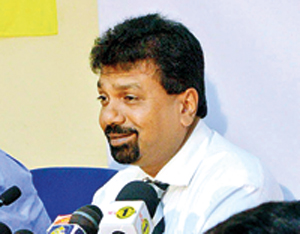Football crisis deepens, as FFSL chief loses trust among fraternity and staff
The vociferous former head of Football Federation of Sri Lanka (FFSL), and the current President of Negombo Football League, Ranjith Rodrigo, surprisingly struck his ally, the incumbent FFSL President J. Sri Ranga, for failing the sport, in the background of an ongoing ban from FIFA. Rodrigo, who supported Ranga at the FFSL elections held on January 14, now alleged Ranga of being self-centered and not standing up for football, considered in Sri Lanka as the ‘poor man’s game’.

Rodrigo alleged Ranga of being 'unskilled'
In a letter addressed to Amal Edirisooriya, the Director General of Sports of Department of Sports Development, he had questioned the true motive of Ranga, who has been ‘too excessive in making foes than friends’ according to Rodrigo.
Exactly after eight days from taking charge of FFSL, for a term of five months, ending May 31, FIFA handed Sri Lanka an indefinite ban citing ‘political interference’. In days to follow, Ranga lost the quorum to conduct an Executive Committee Meeting, after four top officials – Indika Thenuwara, the Secretary General, T. Sudagar, the Treasurer and the two Vice Presidents Dilhan Nagahawatte and Deepika Kumari – tendered their resignations separately.
The number of members of the FFSL Executive Committee is usually 11, but only eight were appointed at its elections held on January 14. To maintain the mass, at least six, but with the resignation of the four officials the number has now come down to four in the Executive Committee, which technically disqualifies Ranga from conducting ExCo meetings.
According to Rodrigo’s letter, only two ‘incomplete Emergency Meetings’ were held for the past eight weeks since January 14, but minutes of the two meetings have not been shared with the ExCo members for approval.
Additionally, Rodrigo has charged Ranga of being ‘abusive’ to the employees of FFSL, which has eventually resulted in seven of senior employees tendering their resignations. It is also said that the incumbent President has verbally ‘abused and threatened’ officials of certain Football Leagues that held their respective AGMs in the recent weeks.
With the present situation, the former TV anchor turned politician is facing a gigantic task of earning the trust among the football fraternity, who are shell-shocked of lack of interest by the current FFSL administration to revoke the ban handed by FIFA.
In 18 segmented points, Rodrigo has highlighted on Ranga’s conduct and administrative skills as ‘totally unacceptable and unethical’ for further deteriorating the situation from ‘bad to worse’, while showing very little commitment to uplift the standards of football.
Moreover the letter highlights the present FFSL administration’s failure to conduct proper Executive or Council meetings in order to appoint designated committees to allocate responsibilities among its membership.
“This type of conduct, I find, as harmful for any sport, and could jeopardize the future of football, its stakeholders such as players, coaches, officials and other sectors of the sport. Adding more insult to the wound,” stated the letter, which also explains on certain occasions where the FFSL head has used his political background and influence to ‘blackmail’ individuals.
Given the fact that Ranga’s tenure coming to an end on May 31, Rodrigo had urged Edirisooriya to call in a Special General Meeting and appoint an Election Committee on or before March 20, at least two months prior to the deadline.
“Please ensure that the current crisis in football needs to be addressed sooner than later, and extending terms, as occurred during the previous administration, would not help FFSL or football in any way, if Sri Lanka is to thrive and regain its lost status with FIFA and AFC. It is recommended that appropriate steps should be taken in order to address the issue,” it added.
Currently, former FFSL President Jaswar Umar is identified by AFC and FIFA as the legitimate representative to Sri Lanka football, while Ranga has not been identified as the official custodian by the regional and global football bodies.


